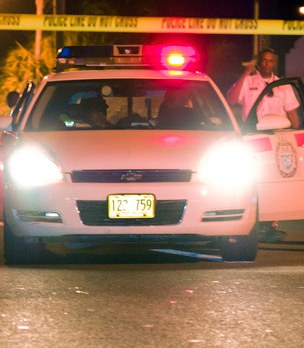Archive for December 17th, 2014

Suspect crack dealer busted
 (CNS): Two people from West Bay have been arrested for a number of drug offences following an early morning bust Wednesday by the RCIPS Drugs and Serious Crime Task Force, together with officers from the Operational Support Group (OSU). An RCIPS spokesperson said that just after 6:00am detectives and police officers conducted a search at a Mount Pleasant residence in West Bay, where crack cocaine, drug paraphernalia and cash was recovered. A 28-year-old man and a 34-year-old woman, both residents of West Bay, were arrested on suspicion of possession of cocaine, possession of cocaine with intent to supply a control drug, consumption of cocaine and possession of a prohibited weapon.
(CNS): Two people from West Bay have been arrested for a number of drug offences following an early morning bust Wednesday by the RCIPS Drugs and Serious Crime Task Force, together with officers from the Operational Support Group (OSU). An RCIPS spokesperson said that just after 6:00am detectives and police officers conducted a search at a Mount Pleasant residence in West Bay, where crack cocaine, drug paraphernalia and cash was recovered. A 28-year-old man and a 34-year-old woman, both residents of West Bay, were arrested on suspicion of possession of cocaine, possession of cocaine with intent to supply a control drug, consumption of cocaine and possession of a prohibited weapon.
Police said that the woman was bailed to return to the George Town Police Station at a later date but the man remains in police custody.

Data protection bill faces human rights challenges
 (CNS): Plans by government to introduce a data protection bill next year remain in question as human rights experts say the final draft of the proposed legislation falls foul of Cayman’s Bill of Rights. The chair of the Human Rights Commission has warned that the draft law is too complicated and most people will not be able to understand it. The final consultation period on the bill is now closed but HRC Chair James Austin-Smith said the commission wants to see more effort placed on public education because, unlike the FOI law, this legislation applies to the private sector as well as public service. Since it will impact the wider community, everyone needs to understand just how significant it could be and what could happen if they breach it, unwittingly or otherwise.
(CNS): Plans by government to introduce a data protection bill next year remain in question as human rights experts say the final draft of the proposed legislation falls foul of Cayman’s Bill of Rights. The chair of the Human Rights Commission has warned that the draft law is too complicated and most people will not be able to understand it. The final consultation period on the bill is now closed but HRC Chair James Austin-Smith said the commission wants to see more effort placed on public education because, unlike the FOI law, this legislation applies to the private sector as well as public service. Since it will impact the wider community, everyone needs to understand just how significant it could be and what could happen if they breach it, unwittingly or otherwise.
In its submissions on the proposed law, during what has been described by officials as the final consultation period on the final draft of the law, the HRC said it still has significant concerns about it. The HRC has pointed to the complexity and warned that efforts to simplify it have seen many of the fundamental protections removed.
The commission has raised concerns about the removal of a right to trial in some circumstances and the fact that the law is based on an outdated 1995 European Directive that doesn’t account for the advances in communication technology. The HRC also points our that, given the significant fines and draconian punishments proposed in the bill, it presents major human rights challenges.
While the law is based broadly on the English and Welsh Data ProtectionAct 1998, albeit with significant changes, the HRC said it creates a number of difficulties for the Cayman law. That UK law has come in for major criticism because it is already way behind the times when it comes to the internet and social networking.
“There have been huge advances in information technology and globalisation which have impacted data retention since 1995. As a result, in 2012, the European Commission announced a new draft legislative package to regulate data protection,” Austin Smith wrote on behalf of the commission, noting that it will be sometime next year when that new law emerges.
While the Data Protection Working Group has tried to anticipated amendments, if Cayman enacts legislation ahead of the changes it will need to be redrafted if the authorities here want to remain in line with the European model.
Basing the local legislation on what Austin-Smith described as “convoluted and complex legislation even for lawyers” does not bode well for the man in the street.
“The HRC remains concerned about the way in which this legislation is drafted and it is envisaged that the broader community will have great difficulty in understanding, and therefore fulfilling their duties, under the Revised Bill should it become law,” he warned.
The HRC believes that in an effort to simplify the complex law in this latest draft the working group have removed some “fundamental protections” creating “significant human rights concerns” and giving enormous power to the data protection commissioner, who, it is anticipated, will be the information commissioner.
Section 51 of the revised bill provides for a sentence of imprisonment of up to 5 years for breach of its terms. The HRC described it as a draconian penalty, but the real human rights concern is the removal of a right to appeal, forcing aggrieved parties to seek judicial review.
“This is an extremely regrettable provision. It means that the ‘appeal’ process in Cayman will be expensive and time-consuming. Lawyers will almost certainly be required. It also, effectively, introduces a reverse burden of proof requiring the aggrieved applicant to demonstrate that the Commissioner has acted contrary to the principles of lawful administrative action,” Austin Smith wrote.
The revised bill also states that the commissioner can certify to the courts that a person “shall be deemed to have committed an offence” if they fail to comply with his or her enforcement. “This is a quite extraordinary provision,” the chair said in the HRC submission.
“It effectively allows the commissioner, acting as prosecutor, to certify guilt and send a person for sentencing – removing the right to a trial. This provision is fundamentally contrary to all accepted international human rights norms, various international treaties and Cayman’s own Constitution. The HRC urges the DPWG to remove this provision from the Revised Bill and introduce the right to a trial for those accused of a breach of the law.”
Although government officials at the start of the last public consultation, which is now closed, noted that this was the final draft for discussion, it may still change before it goes to Cabinet and before it becomes a white paper.
The submissions and comments made over the last two months by interested parties and stakeholders will now be considered by the data protection working group who may still make significant changes before the law goes before Cabinet next year.
See the HRC submission and the draft law below and for more information visit dataprotection.ky

Operation Dasher racks up tickets and arrests
 (CNS): As the police continue their Christmas crime crackdown, officials confirmed that just one week after the campaign began 188 people have been ticketed or arrested for traffic infractions. Operation Dasher, the working titled for this year’s festive focus on crime and safety, began on Wednesday 10 December and has netted nearly 200 people already for a catalogue of infractions, from speeding to driving under the influence of alcohol. In the last week just six people were arrested for drinking and driving but the police anticipate that there will be many more over the next few weeks as they urge people to use designated drivers or alternative transport.
(CNS): As the police continue their Christmas crime crackdown, officials confirmed that just one week after the campaign began 188 people have been ticketed or arrested for traffic infractions. Operation Dasher, the working titled for this year’s festive focus on crime and safety, began on Wednesday 10 December and has netted nearly 200 people already for a catalogue of infractions, from speeding to driving under the influence of alcohol. In the last week just six people were arrested for drinking and driving but the police anticipate that there will be many more over the next few weeks as they urge people to use designated drivers or alternative transport.
“The motoring public are advised to use designated drivers or charter buses when attending Christmas functions, especially if they plan on consuming alcohol,” an RCIPS spokesperson stated. “Drink driving, speeding, cell-phone driving and failing to wear seatbelts are just a few of the traffic offences which will be targeted by RCIPS officers over the coming weeks in a bid to reduce deaths and injuries on Cayman’s roads.”
The Christmas crackdown campaign continues through into the New Year until Sunday 4 January 2015.

Welcome mat out for property owners and business
(CNS Business): A number of changes to the immigration regulations are expected to make life easier for wealthy visitors, business people and property owners coming to the Cayman Islands. Policy directives that were recently approved by Cabinet will allow business travelers to remain in the country for up to 10 working days without the need to obtain a work permit and allow those who own property in the Cayman Islands and can demonstrate their wealth to stay for up to six months without having to check in with the immigration department for visa extensions. The directive announced in October was published on the government’s Gazette on Friday. (Read more on CNS Business)

Gas prices unrealistic and unjustified
The prices at the retail pumps across Grand Cayman are unrealistic, unjustified and cannot be allowed to continue without intervention from our government. Although I write for myself, I am sure that I echo the sentiments of many who call these Islands home, that I am completely mystified as to how across the United States you can drive up to a gas station and purchase gas at US$2.00 a gallon and we here in Grand Cayman continue to pay CI$5.65 or US$7.06.
We purchase the majority of our fuel from the Gulf States, Texas in particular. In Texas today (December 10th); the average price of gasoline was US$ 2.16 per gallon.
Global oil prices are at levels last seen before the global economic meltdown. However, recent events are placing even more downward pricing pressures on oil prices generally: US domestic increased production; additional capacity coming on stream such as Africa (due to less internal political turmoil and more oil reserve findings) and so far, the oil production from Iraq has not been threatened by the ISIS threat. To further drive prices down, Asia and Europe demand is assessed to be weakening, creating what will likely be another “oil glut” in the New Year.
Some retailers of gasoline have said to me that we have to be mindful when comparing US prices to those in Cayman because of the US government subsidy given for Ethanol production. Well, my research shows that the US government did in fact have such a subsidy but it ended in 2011. Also, the subsidy was to US refineries only.
Our local gasoline suppliers should not be allowed to continually play games with the Caymanian consumers by always throwing up clichéd excuses like “economies of scale”; “global events”; “lagging effect”; “fuel duties” and “irrelevant US retail prices” because the true fact is that 90% of our gasoline that is imported in the Cayman Islands comes from the US Gulf States, predominantly Texas, and today you can buy a gallon of gas in Texas for US$2.16 per gallon. Indeed, since 2012, the price of regular gas (US$/G) has fallen some 40% to some US$2.60 currently.
We in the Cayman Islands have not seen a reduction of that magnitude ever!
The recent reduction of cents per gallon equates only to 0.07%. We can surely demand and expect a better treatment by our local gasoline suppliers than that.
One should also bear in mind that when these large oil companies are entering the marketplace to purchase their allotment of oil supplies, they utilize their profit centers to place their bulk orders. These profit centers are wholly owned subsidiaries of their parent companies and as such they utilize their tremendous purchasing power to ensure that they can secure their individual fuel allocation (based on forecasted demand from their regional counties/ islands that they supply) at discounted prices. This is so because in the real marketplace the more you purchase (in monetary terms) the greater is your leverage to secure lower or most favored prices.
To conclude my letter and hopefully drive my main argument home let me say this:
Once these profit centers (wholly owned subsidiaries of the large oil companies) purchase their fuel allotment, they then in-turn “on-sell” their fuel to their clients. These can be other smaller subsidiaries that are scattered around the world but certainly they will include those in the Cayman Islands.
These larger oil companies have the capacity to even bulk store their fuel and then to “sell/ deliver” to their smaller regional subsidiaries or affiliated companies as and when they demand more supplies. But what is vitally important to always bear in mind is that these regular and random oil deliveries that one sees arriving at our South Sound Terminal are not (I repeat!) not, being purchased at high prices on a spot basis. These are inventory fuel deliveries, made in advance, at the best possible market prices, by these individual “profit centers” or wholly owned subsidiaries of the large oil companies.
In essence, due to their ability to bulk store their own oil inventory, these “profit centers” are actually “selling” to Cayman their own fuel product.
I support the ongoing discussions with south Texas based Navasota Energy, which I firmly believe would result in our own ability to experience long term lower fuel prices by the development of a new bulk fuel storage facility which could be ideally situated in the deep waters in our Eastern district. Failing that, it is my position that government should consider the implementation of price control legislation, which could be invoked as the situation demands, to address what we are currently experiencing.
What I am saying is that we, the general public, in these beloved Cayman Islands are being subjected to modern day “high way robbery” by our local gasoline oil distributors’ and also that based on what has been happening in the global oil and petroleum market, since 2012, the retail prices that we are being subjected to in regards to our local gas prices are “unrealistic” and “unjustified”.

Cops with convictions remain
 (CNS): The firestorm following the recruitment of a now convicted murderer to the RCIPS has raised a long standing public complaint that the police have a history of failing to check the background of those recruited to the service. The police commissioner recently confirmed that at least one other serving police officer was recruited with at least one criminal conviction. The prison service has committed to reviewing every one of its employees after it discovered recently that one of its officers was a registered sex offender. But even though there are concerns that others with a questionable history may be on the police payroll, there has been no indication that the RCIPS management will be doing any kind of review.
(CNS): The firestorm following the recruitment of a now convicted murderer to the RCIPS has raised a long standing public complaint that the police have a history of failing to check the background of those recruited to the service. The police commissioner recently confirmed that at least one other serving police officer was recruited with at least one criminal conviction. The prison service has committed to reviewing every one of its employees after it discovered recently that one of its officers was a registered sex offender. But even though there are concerns that others with a questionable history may be on the police payroll, there has been no indication that the RCIPS management will be doing any kind of review.
Commissioner David Baines recently confirmed that an officer is working in the RCIPS who was convicted at least once with possession of a significant amount of ganja before joining the service.
Baines said that although this was a spent conviction, which means that enough time had elapsed that it was no longer taken into account for legal purposes, police officers, like a number of other public servants, are obligated to reveal all past convictions, regardless of how old. In this case the officer, who remains on staff, did not do so. In 1996, two years after he was recruited, the officer was, Baines said, the “subject of a disciplinary inquiry by the then Deputy Commissioner of Police, who recognized the failing had occurred with no overseas vetting procedures being undertaken.”
The commissioner said this led to a review of recruitment practices. The chief inspector of the training department was advised of the failings and the RCIPS application form was amended to ensure all convictions, including spent convictions, are revealed in an application.
CNS cannot name the officer in question because the police commissioner said we would be committing an offence if we did.
The officer was reportedly spoken to about his failure to reveal his past criminal record as it was a spent conviction, it was “determined that he should be retained by the RCIPS”, Baines said, and he remains in office to date.
The commissioner also confirmed that he had, since taking up the top job at the RCIPS, dismissed another officer who was appointed to the RCIPS with a previous convictions and had served time at HMP Northward.
“Whilst his appointment was prior to my arrival in the Cayman Islands, I discharged him whilst in his police probationary period as being unlikely to make an effective police officer,” Baines added.
Over the years allegations of officers from Jamaica and elsewhere arriving in Cayman with a chequered history are not uncommon and thereare concerns that the RCIPS is still not conducting the level of background checks the public wants to see when it comes to those entrusted to enforce the law. The complaint, however, is not confined to the police, prison or other law enforcement agents but across government and in the private sector as well.
The recruitment of people to Cayman from all over the world leaves the jurisdiction vulnerable, with the credibility of police clearance certificates from overseas, references and other alleged credentials rarely checked. There is a widely held perception in the community that as a result of the weaknesses in background checks, overseas recruits serving in position of trust in both the private as well as public sectors with a questionable and even criminal past is not uncommon.